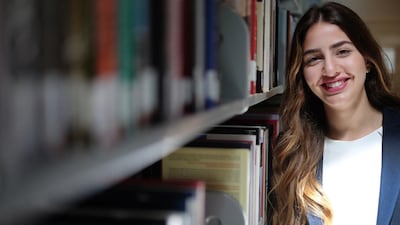ABU DHABI // Losing three relatives to cancer has inspired Farah Shamout to apply her engineering skills to medicine.
As a computer-engineering student at New York University Abu Dhabi, the Jordanian is contributing to research that could change the future of treating cancer and other diseases.
The 21-year-old spent four months working with a lecturer at the Imperial College London to research ways to deliver medicine to diseased cells using ultrasound.
The research aimed to create non-invasive techniques to treat cancer and heart disease, and was published in the Journal of Ultrasound in Medicine and Biology.
Two years ago, cancer claimed the lives of two of Ms Shamout’s uncles and her grandmother.
“Since I wasn’t studying medicine or biology, I wanted to find a way in which I could use what I’m studying for the purpose of curing cancer. The only way I could do that was through biomedical engineering,” she said.
“There is a lot of research being put into this area and I just wanted to contribute to it, regardless of whether the results of my research will be employed in two, five or even 20 years.”
Dr James Choi, a lecturer at the college’s bioengineering department, mentored Ms Shamout.
“Side effects are the most common reason a drug fails clinical trials,” said Dr Choi, who noted that the research could provide a method of targeting drugs and minimising damage to surrounding tissue.
“This technology is being developed by several groups around the world. We are collectively understanding and developing this idea so that it can one day be used on patients.”
Dr Choi chose Ms Shamout to help conduct research in his laboratory after receiving her resume and interviewing her.
“Farah’s project was about creating a new capability,” he said.
When taken orally or intravenously, a drug is absorbed in different parts of the body. For certain diseases, the drug is not able to reach the desired location for effective treatment.
Ms Shamout’s work used ultrasound combined with “acoustically-active” particles to improve drug uptake into cells, Dr Choi said.
“Using her system, she optimised our non-invasive device and was able to achieve the highest drug delivery rate with minimal cell death.”
The laboratory will begin pre-clinical studies of Ms Shamout’s technique.
“The technology is around 10 years away from reaching hospitals,” said Dr Choi. “We will need to build a clinical prototype and work with a pharmaceutical company to see whether we can enhance the effectiveness of a drug.”
Last year, Ms Shamout received a Rhodes scholarship and will study at the University of Oxford to pursue her doctorate.
She hoped to return to the Middle East after her studies to help fight cancer and cardiovascular disease. “This kind of research is lacking in the region. I want to learn and come back and help.”
arizvi2@thenational.ae


